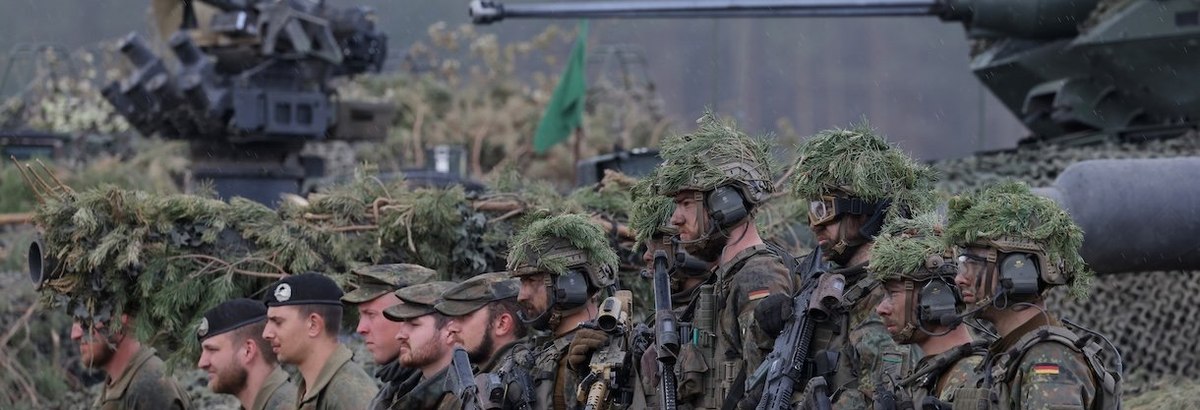Younger Americans are more likely than older generations to think military alliances and NATO increase the chances of war taking place. Americans overwhelmingly support the existence of NATO but differ on whether it should be used to attack other countries considered a threat
Since the full-scale Russian invasion of Ukraine in 2022, a growing number of countries have signed security pacts, relating to defense arrangements, armaments, and intelligence sharing. Just in 2024, military/defense agreements were signed between several countries, both in the East and the West: between the UK and Ukraine; the UK and Australia; the U.S. and Japan; Germany, France, and Ukraine; Germany, the Netherlands, and Poland; France and Moldova; China and the Maldives; India and France; Russia and Niger. In 2023 the U.S. signed defense pacts in Europe with Sweden, Finland, and Denmark.
More than four in ten Americans (44%) think that military alliances decrease the chances of war taking place, the new YouGov Study of NATO and War finds. This is about twice as many as the share who say military alliances increase the likelihood of war breaking out (24%).
About one-fifth of Americans (18%) don’t think military alliances have an impact either way, while 14% say they don’t know.
Adults under 40 are more likely to think alliances between states increase the chances of wars than are older Americans (34% vs. 18%.)
Also, Joe Biden supporters are more likely than Donald Trump supporters to say alliances lower the chances of a war (55% vs. 45%).
The North Atlantic Treaty Organization (NATO) recently marked 75 years since its founding. Currently, the alliance has 32 member states, from Europe and North America, and is the largest military bloc on the planet.
Seven out of ten Americans (71%) strongly or somewhat support NATO, including 40% who “strongly support” the military alliance. While both Trump and Biden supporters are largely in favor of NATO, the percentage is higher among those who would vote Democratic (89%) than among Trump supporters (70%).
One in eight Americans (13%) oppose the existence of NATO. Opposition is significantly higher among Trump supporters — 20% — than among Biden supporters (6%).
One in five Americans (19%) think that the existence of NATO increases the likelihood of war taking place — including 29% of adults under 40 and 13% of older Americans.
Nearly half of Americans (46%) think NATO lowers the chance of war, with this view most common in the oldest age group: 58% of Americans 60 or older.
NATO defines itself as a defensive alliance in its founding document from 1949. However, in recent years the organization has taken action in countries that are not in the alliance or have not attacked one of its members — including in Bosnia in 1995, Yugoslavia in 1999, as well as in Libya in 2011. And some members of the alliance took part in military operations in Afghanistan in 2001 and Iraq in 2003. Currently, NATO provides military support to Ukraine, which is engaged in a war with Russia.
About half of Americans (48%) think NATO should be used only if a member of the alliance is attacked — in line with NATO’s defense clause that an attack on any member is an attack on all members. However, three in ten (30%) think that NATO should also be used to attack countries that are considered a threat.
Biden supporters are more supportive than Trump supporters of the idea of using NATO to attack other countries considered a threat (36% vs. 28%).
In 1999 NATO bombed Yugoslavia, arguing it was done to "end the violations of human rights and killing of civilians." The legality of this operation has been a matter of contention in international law ever since. Conflicts in recent decades have raised questions about the concept of international intervention for humanitarian reasons in places such as Burkina Faso and Rwanda.
Six in ten Americans (63%) approve of NATO involvement in humanitarian military operations. While 27% say that should be done regardless of whether the United Nations gives approval or not, 36% think this should be done only with a U.N. mandate.
Eight in ten Biden supporters (82%) back the idea of NATO’s involvement in humanitarian military interventions, while this view is shared by about half (53%) of Trump supporters.
— Bryn Healy and David Montgomery contributed to this article
See the results for this YouGov poll
Methodology: This poll was conducted online on March 18 - 27, 2024 among 2,217 U.S. adults. Respondents were selected from YouGov’s opt-in panel to be representative of U.S. adults. The sample was weighted according to gender, age, race, and education. The margin of error for the overall sample is approximately 2%.
Image: Getty (Sean Gallup / Staff)







